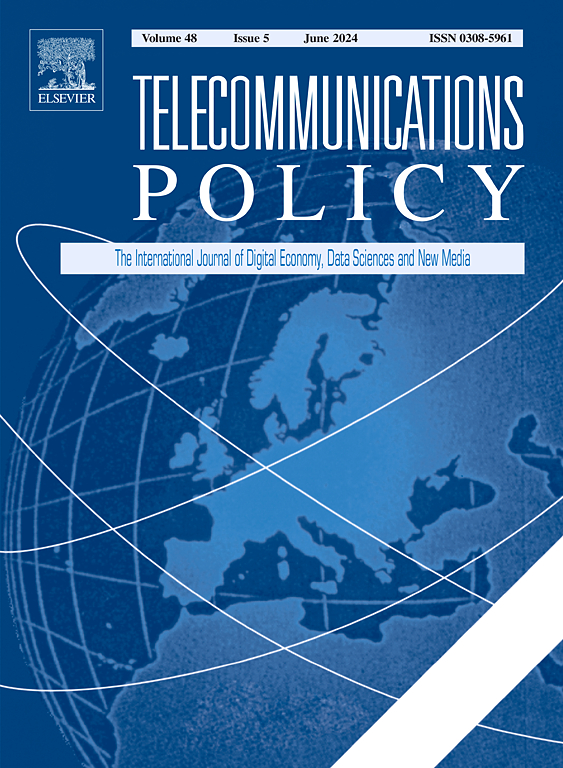Greening the telecommunications industry – Consumer preferences and surcharges for environmental attributes of mobile phone plans
IF 6.4
2区 管理学
Q1 COMMUNICATION
引用次数: 0
Abstract
Incorporating environmental sustainability in products and services is becoming increasingly important for the telecommunications industry. Mobile communications providers, in particular, face the challenge of integrating sustainability into their product design and communication, as their offerings cover both services (e.g., mobile phone plans) and hardware (e.g., smartphones). Whether consumers are willing to pay a premium price for environmentally sustainable telecommunications products and services remains unclear. In the absence of previous empirical research, the present study investigates consumer preferences and the willingness to pay (WTP) for environmentally sustainable mobile telecommunication bundles, with particular emphasis on differences based on consumers’ green consumption values. A three-step pre-study process involving experts and consumers was conducted prior to the application of an adaptive choice-based conjoint analysis (ACBC) among 495 German consumers (using the summed price approach). Compared to price, data volume, and a brand-new smartphone, our findings indicate lower significance of attributes such as smartphone warranty, Eco Rating, and cloud storage. Green consumers place greater value on the smartphone, Eco Rating, and green cloud storage than non-green consumers. The latter exhibit greater price sensitivity and focus less on environmental criteria in their purchase decisions. The WTP for an environmentally-friendly mobile phone plan among green consumers is €11 higher than for non-green consumers. This study contributes to the literature by adding the sustainability dimension to preference research for telecommunications services and by unveiling the relative importance of sustainability in the purchase decision for mobile phone plans.
绿化电讯业-消费者对流动电话计划的环境属性的偏好和附加费
将环境可持续性纳入产品和服务对电信业来说变得越来越重要。移动通信提供商尤其面临着将可持续性纳入其产品设计和通信的挑战,因为它们的产品既包括服务(例如,移动电话计划),也包括硬件(例如,智能手机)。消费者是否愿意为环境可持续的电信产品和服务支付高价仍不清楚。在缺乏以往实证研究的情况下,本研究调查了消费者对环境可持续移动通信套餐的偏好和支付意愿(WTP),特别强调了基于消费者绿色消费价值观的差异。在对495名德国消费者(使用总价法)进行基于自适应选择的联合分析(ACBC)之前,对专家和消费者进行了三步预研究过程。与价格、数据量和全新的智能手机相比,我们的研究结果表明,智能手机保修、生态评级和云存储等属性的重要性较低。与非绿色消费者相比,绿色消费者更看重智能手机、生态评级和绿色云存储。后者在购买决策中表现出更大的价格敏感性,对环境标准的关注较少。在绿色消费者中,环保手机计划的WTP比非绿色消费者高11欧元。本研究通过将可持续性维度添加到电信服务偏好研究中,并通过揭示可持续性在移动电话计划购买决策中的相对重要性,为文献做出了贡献。
本文章由计算机程序翻译,如有差异,请以英文原文为准。
求助全文
约1分钟内获得全文
求助全文
来源期刊

Telecommunications Policy
工程技术-电信学
CiteScore
10.80
自引率
12.50%
发文量
122
审稿时长
38 days
期刊介绍:
Telecommunications Policy is concerned with the impact of digitalization in the economy and society. The journal is multidisciplinary, encompassing conceptual, theoretical and empirical studies, quantitative as well as qualitative. The scope includes policy, regulation, and governance; big data, artificial intelligence and data science; new and traditional sectors encompassing new media and the platform economy; management, entrepreneurship, innovation and use. Contributions may explore these topics at national, regional and international levels, including issues confronting both developed and developing countries. The papers accepted by the journal meet high standards of analytical rigor and policy relevance.
 求助内容:
求助内容: 应助结果提醒方式:
应助结果提醒方式:


